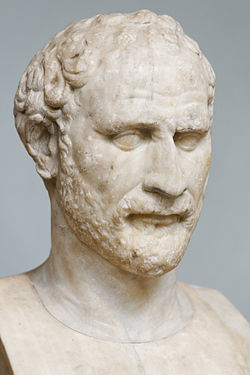
Demosthenes
Demosthenes of Athens (Δημοσθένης)
Ancient Athens' greatest orator whose passionate speeches defending democracy made him one of history's most influential public speakers.
Biography
Demosthenes stands as a towering figure of classical oratory, a man who transformed personal adversity into unmatched eloquence. Born into a wealthy Athenian family in 384 BC, his early years were marked by struggle, his father died when he was young and his guardians squandered his inheritance. To add to his challenges, Demosthenes suffered from a speech impediment that made public speaking nearly impossible. His stammer and weak voice were seen as insurmountable obstacles in a society that revered oratory as the highest form of civic engagement.
Rather than accept defeat, young Demosthenes turned these obstacles into motivation. He trained rigorously to overcome his speech defect, reportedly practicing with pebbles in his mouth and reciting verses while running uphill to strengthen his voice.
By his thirties, Demosthenes had become Athens' leading orator and voice warning against the rise of Philip II of Macedon. His series of speeches known as the Philippics represent some of the finest examples of deliberative oratory ever composed. Though he ultimately failed to prevent Macedonian conquest, his passionate defense of Athenian democracy and independence secured his place among history's greatest speakers.
As a Public Speaker
What set Demosthenes apart was his unique combination of meticulous preparation and passionate delivery. Unlike his contemporary Aeschines, who relied on natural charm and theatrical presence, Demosthenes built his speeches through careful research, logical argument, and relentless practice. Ancient sources tell us he would retreat to an underground study for months, shaving half his head to resist the temptation to go out in public.
His speaking style was characterized by precision of language, complex periodic sentences that built to powerful climaxes, and an uncanny ability to anticipate and refute his opponents' arguments. He mastered all three branches of classical oratory: forensic (courtroom), deliberative (political), and epideictic (ceremonial.) But he excelled particularly in the challenging art of deliberative speaking.
Demosthenes possessed an almost supernatural ability to read his audience and adapt his approach accordingly. In the Assembly, he could shift from detailed policy analysis to soaring appeals to Athenian pride, from reasoned argument to righteous indignation. His physical delivery, though initially awkward, became commanding through years of practice. Contemporary accounts describe his piercing gaze, emphatic gestures, and voice that could range from conversational intimacy to thunderous denunciation.
Notable Speeches
A chronological collection of Demosthenes' most significant orations
On the Chersonese
A masterful deliberative speech defending Athenian policy in the strategic Chersonese peninsula and exposing Philip's systematic expansion.
Read MoreLegacy & Impact
Rhetorical Innovation
Demosthenes revolutionized the art of public speaking through his synthesis of logical argument and emotional appeal. His techniques for structuring complex arguments, his mastery of rhythm and timing, and his ability to transform policy debates into moral crusades established principles that continue to influence speakers today. Law schools and debate programs still study his methods for constructing persuasive arguments and handling hostile audiences.
Political Thought
Through his speeches, Demosthenes articulated a sophisticated theory of democratic governance and civic responsibility. His warnings about the dangers of appeasement, his analysis of how authoritarian powers exploit democratic processes, and his calls for active citizenship have resonated across centuries. His work influenced political thinkers from Cicero to modern democratic theorists.
Literary and Educational Legacy
For over two millennia, Demosthenes has been regarded as the gold standard of oratory. From Roman schools to Renaissance academies to modern universities, students have studied his speeches to learn the principles of effective communication. His influence extends beyond oratory to literature, with writers from Cicero to Edmund Burke acknowledging their debt to his example.
Notable Quotes
The really serious problem is the state of the Chersonese and Philip's Thracian campaign, now in its eleventh month; yet most of the speeches have been confined to what Diopithes is doing or what he is going to do.
— On the Chersonese, 341 BC
Therefore you must needs bear in mind that this is a life-and-death struggle.
— On the Chersonese, 341 BC
For we have no choice in the matter, but there remains the most righteous and most necessary task of all... To defend ourselves against the aggressor.
— On the Chersonese, 341 BC
I see not that any words, divorced from the necessary action on your part, can ever save the State.
— On the Chersonese, 341 BC
Discover More Great Orators
Explore our collection of speeches from history's most influential speakers.